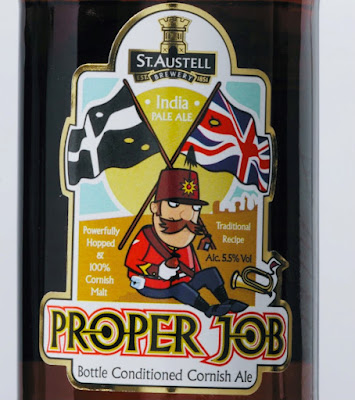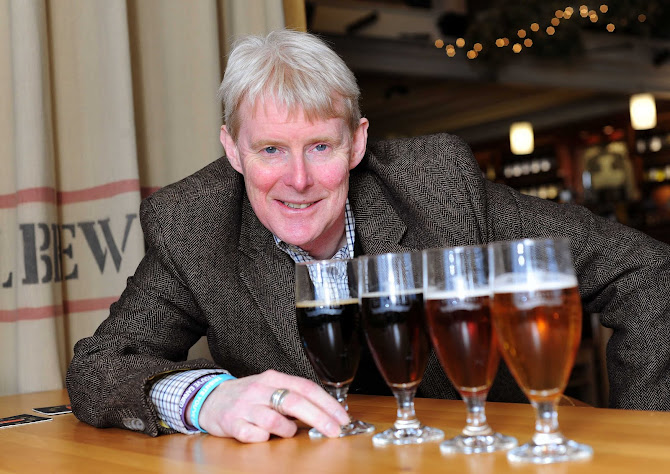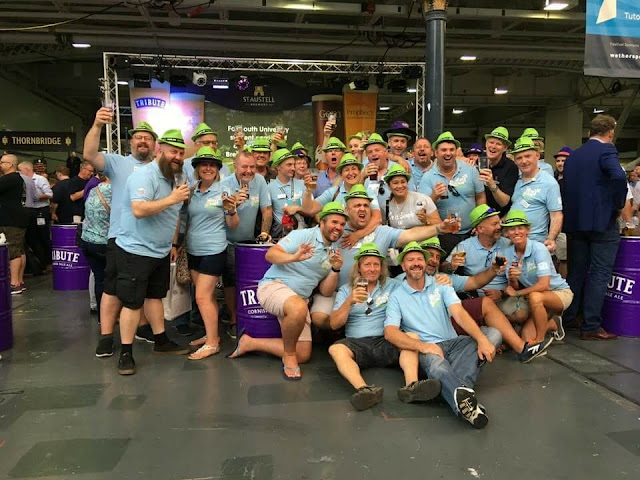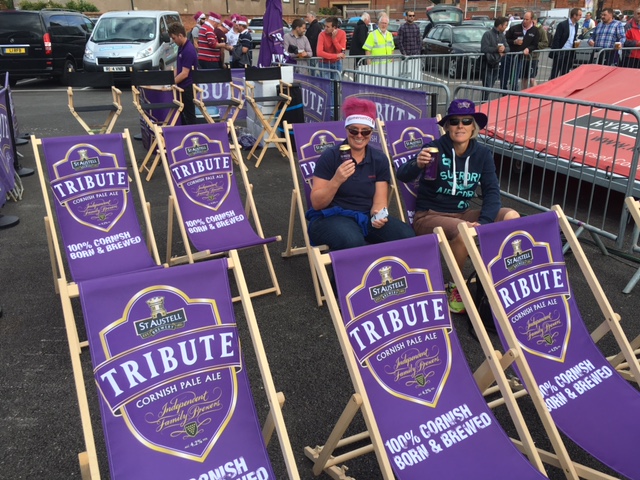St Austell Brewery Proper Job, what a great name and its also a fantastic beer and winner of many awards. However, Proper Job as a beer had a slow start to life as we'll see.
Proper Job was first conceived in 2004 when Head Brewer Roger Ryman visited the Bridgeport Brewery in Oregon, USA which had produced an award winning IPA. Filled with enthusiasm, Roger returned to St Austell and developed his own version that was to become Proper Job. First brewed in 2005 on cask for the Celtic Beer Festival, it was launched in bottles a year later, although I do recall an unlabelled champagne version in conjunction with the Camel Valley Winery and still have a bottle.
When first launched in bottle Proper Job had a very different quirky cartoon style label, most un-St Austell Brewery and looked more likely to have come from another Cornish brewer in Skinners. The label focused on the story of the name where the phrase Proper Job was first used by Queen Victoria. She awarded the 32nd (Cornwall Regiment) the honour of becoming a Light Infantry Regiment in recognition of a stout defence of their garrison during the Indian Mutiny in 1857-88. The label featured a fun illustration of a soldier, although Roger was once heard to remark it looked more like Officer Crabtree from Allo Allo!
 |
| Original label design |
 |
| Officer Crabtree from Allo Allo |
The beer had a cutting edge flavour ahead of its time and was an immediate success. The bottle was 5.5% abv, ideal for a beer to enjoy at home but probably too strong to make commercial appeal on draught. For this reason when Proper Job first featured as a draught beer as part of the St Austell Brewery seasonal beer programme, the abv was reduced to 4.5%. This anomaly between bottle and draught was to remain and often caused some confusion, although it has to be said an abv difference between on and off trade variants is far from unusual.
Proper Job as a seasonal beer was a success so the decision was taken to make the beer a permanent part of the St Austell cask portfolio. Roger was unhappy with the link to the Indian Mutiny story, rightly reasoning that it was not something we should mark, so the pump clip/bottle label changed to its now familiar white and black design - a much better fit for a traditional Regional Brewer.
As a cask beer Proper Job was a slow starter, often filling a pubs rotational guest beer slot, it would come and go. However, in bottles where Rogers decision to make Proper Job a bottle conditioned beer, it was a very different story and soon established its spot on supermarket shelves. St Austell's investment in its own bottling facility bought quality improvements to its entire bottle range and they quickly became masters of bottle conditioned beers. The latter process meant that any excess oxygen in the bottling process was mopped up during the secondary fermentation in the bottle conditioning process, thus ensuring Proper Job's aroma and taste were more consistent, lasting a lot longer without apparent changes.
The one draw back of the bottle conditioning was the sediment issue whereby consumers who were unfamiliar with the process would either lay the bottle down in the fridge, and or pour the entire contents including the sediment into the glass that resulted in cloudy beer. We did experience a regular trickle of customer complaints about this leading Roger to experiment with one brew that was not bottled conditioned. However this did not meet our quality expectations so was quickly dropped. On the positive side the marketing team developed the Proper Pour initiative and this was communicated on the bottle and via social media and led to fewer complaints.
Proper Job in bottles continued to thrive and all of Rogers hard work was being recognised in terms of awards, including CAMRA's much prized Champion Bottled Beer of Britain Gold award in 2011. Furthermore it has finished in the top three in this competition an amazing four times since its launch which says volumes about its consistency. Brand extensions also appeared in Proper Black, a Black IPA and Big Job, a Double IPA. Again, two amazing beers with Big Job itself scooping CAMRA's Gold Award in 2017.
 |
| Receiving the Champion Bottled Beer Silver & Bronze awards for Proper Job & Big Job in 2019. |
If you look at how most beer brands are built and grow, its normally on-trade (pubs/bars) led, with the off-trade (supermarkets/shops) following. Proper Job was different in that respect, the brand was primarily built in the off-trade. This was partly fuelled by social media and St Austell launched its unique Proper Job Ambassador scheme, whereby members of the public were appointed to become social media champions for the beer and it soon became one of the most talked about beers online.
In pubs the growth was still slow but in 2017/18 a redesign of the bottle label and more importantly pump clip took place. Its rare for a packaging redesign to have a significant affect of sales but in Proper Job's case in pubs it certainly did. St Austell had always put quality first, both in terms of its beer ingredients and marketing/advertising materials. St Austell employed the services of Brighton based marketing agency CookChick to lead the project and the new pump clips they created for both Proper Job and Tribute were superb, great stand out and quality clips. Proper Job with its unique 3d hop design was so different and gave the brand fresh life, reinforcing its premium-ness but also giving it appeal to the younger craft ale consumers.
 |
| Showcasing Proper Job and its new pump clip at Swindon Beer Festival |
When Roger first conceived this beer it was ahead of its time and that might partly explain its slow start to life on cask. However, today it is a wonderful beer with great branding and in bottle its still one of the best IPA's available. I left St Austell 18 months ago and am pleased to say I still buy and drink the beer. I am very proud to have been part of the Proper Job story and the part I played in contributing to its success. Proper cheers everyone!
 |
| Proper Job Ambassadors at the Great British Beer Festival. |
























